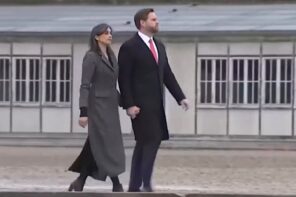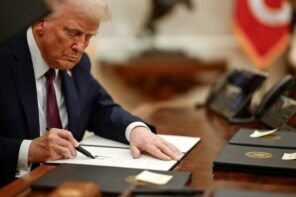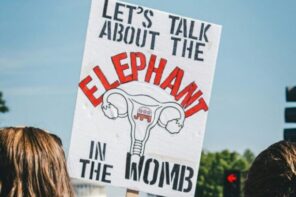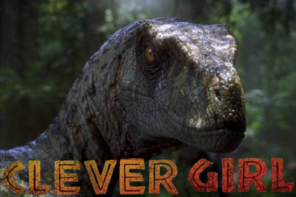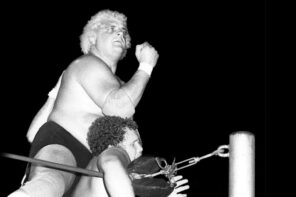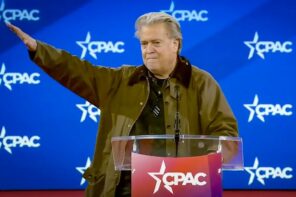When filmmakers Joe Fox and James Nubile convinced officials and activists on both sides of the 2009 initiative to repeal Maine’s marriage equality law to give them “fly on the wall” access during the campaign, they had no idea that the chair of the effort to repeal the equality law would become their star. Religious right leaders frequently portray LGBT people as tortured souls, but the only tortured soul in Question One: the Battle for Same-Sex Marriage in America is Marc Mutty, who was the titular head of the Yes on One campaign, working on loan from the diocese of Portland under the orders of the bishop.
Back in April, when a trailer was released with footage of Mutty essentially admitting that he had betrayed his principles in the campaign (which had been “a fucking son of a bitch”), Mutty and the National Organization for Marriage went into damage control mode, suggesting that he had been misrepresented and taken out of context. But the full documentary, which was screened by Fox at the National Lesbian and Gay Journalists Association convention this past weekend, makes it clear that Mutty was deeply uncomfortable with the campaign strategy that was forced on him by Frank Schubert.
Schubert is the political strategist who came up with the idea of manufacturing concerns about hypothetical consequences of marriage equality in order to win California’s Prop 8 in 2008. The following year he was paid by NOM to bring the same tactics and fear-mongering ads about schools to Maine. In the documentary, Mutty admits to the campaign’s “hyperbole” and talks about asking for forgiveness for ways in which he betrayed himself by going along with Schubert’s strategy.
During the campaign, for example, Mutty told NPR that people were right to be concerned that children as young as seven or eight “are being taught about gay sex in some detail” in their schools. Nonetheless, Mutty—who looks miserable in just about every appearance in the documentary—shrugs, “it’s all about winning.” But he also has enough ego to be upset when Schubert, who had stayed behind the scenes during the campaign, hogs the cameras during the declaration of victory.
The documentary exposes several myths promoted by the opponents of marriage equality in Maine, including that it was a Maine-based campaign when California-based Schubert-Flint was clearly calling the shots; and that it wasn’t about homosexuality, when religious objections to homosexuality were clearly a driver for many of the activists and leaders. At one campaign rally, for example, a speaker portrays the campaign as a spiritual battle against the devil himself.
One press conference orchestrated by Schubert-Flint used teenagers as props, including one who claimed that at her public school she was made to feel like a second-class citizen for being straight. It seemed like a ludicrous assertion, so I asked filmmaker Joe Fox who told me that those teens were brought out to read their scripted statements, then declared off limits for follow-up questions.
Question 1 also makes it clear that religion was a motivator for many people on the pro-equality side as well, documenting campaign events organized by pro-equality clergy and people of faith. One of the most poignant comments comes from a No on 1 (pro-equality) volunteer, a woman raising a child with her partner (and who is, herself, a churchgoer) who asks of her opponents, “Do they think God created 10 percent of the population for them to revile?”
Question 1 does a good job showing the human side of both proponents and opponents of marriage equality. Filmmaker Fox says he thinks documentaries reach people by demonstrating humanity, not through polemic. He said in an interview that his conversations with people like Pastor Bob Emrich, and one of Emrich’s congregants who is followed closely in the movie, reminded him of conversations he had as a journalist with other groups of people over the years who felt as if their world were changing too fast, that they had no control, and who in response dug in their heels—from Protestants in Northern Ireland, to Afrikaners in South Africa, to right-wing Israelis opposed to giving up their land.
Says Fox, “They, too, feel disenfranchised and marginalized, that society is being turned upside down and their place in the world is being eroded. That interested me.” He says that when you try to tell a story, you search for a human connection, and that as a gay person, as someone who was adopted, as someone who is Jewish, he was able to feel that common humanity, that common experience of feeling marginalized, with some of the anti-equality volunteers.
That sentiment is echoed in the voice of a No on 1 volunteer, who in the midst of her grief over the success of the vote to repeal the equality legislation, says that her impulse is not to lash out at the people who voted against equality, but to try to talk to them. Given that marriage equality proponents have begun a push to bring marriage back to the ballot in 2012, she may have lots of opportunities to do just that.
Question 1 is scheduled to have limited release this fall with a national rollout in January.
